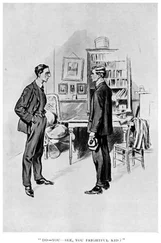Pelham Wodehouse - A Prefect's Uncle
Здесь есть возможность читать онлайн «Pelham Wodehouse - A Prefect's Uncle» весь текст электронной книги совершенно бесплатно (целиком полную версию без сокращений). В некоторых случаях можно слушать аудио, скачать через торрент в формате fb2 и присутствует краткое содержание. Жанр: Классическая проза, на английском языке. Описание произведения, (предисловие) а так же отзывы посетителей доступны на портале библиотеки ЛибКат.
- Название:A Prefect's Uncle
- Автор:
- Жанр:
- Год:неизвестен
- ISBN:нет данных
- Рейтинг книги:4 / 5. Голосов: 1
-
Избранное:Добавить в избранное
- Отзывы:
-
Ваша оценка:
- 80
- 1
- 2
- 3
- 4
- 5
A Prefect's Uncle: краткое содержание, описание и аннотация
Предлагаем к чтению аннотацию, описание, краткое содержание или предисловие (зависит от того, что написал сам автор книги «A Prefect's Uncle»). Если вы не нашли необходимую информацию о книге — напишите в комментариях, мы постараемся отыскать её.
A Prefect's Uncle — читать онлайн бесплатно полную книгу (весь текст) целиком
Ниже представлен текст книги, разбитый по страницам. Система сохранения места последней прочитанной страницы, позволяет с удобством читать онлайн бесплатно книгу «A Prefect's Uncle», без необходимости каждый раз заново искать на чём Вы остановились. Поставьте закладку, и сможете в любой момент перейти на страницу, на которой закончили чтение.
Интервал:
Закладка:
It was an absurdly easy stroke, and the Bishop's uncle took it with an absurd amount of conceit and carelessness. Hardly troubling to aim, he struck his ball. The cue slid off in one direction, the ball rolled sluggishly in another. And when the cue had finished its run, the smooth green surface of the table was marred by a jagged and unsightly cut. There was another young man gone wrong!
To say that the farmer laughed would be to express the matter feebly. That his young opponent, who had been irritating him unspeakably since the beginning of the game with advice and criticism, should have done exactly what he had cautioned him, the farmer, against a moment before, struck him as being the finest example of poetic justice he had ever heard of, and he signalized his appreciation of the same by nearly dying of apoplexy.
The marker expressed an opinion that Farnie had been and gone and done it.
''Ere,' he said, inserting a finger in the cut to display its dimensions. 'Look 'ere. This'll mean a noo cloth, young feller me lad. That's wot this'll mean. That'll be three pound we will trouble you for, if you please.'
Farnie produced his sole remaining sovereign.
'All I've got,' he said. 'I'll leave my name and address.'
'Don't you trouble, young feller me lad,' said the marker, who appeared to be a very aggressive and unpleasant sort of character altogether, with meaning, 'I know yer name and I knows yer address. Today fortnight at the very latest, if you please. You don't want me to 'ave to go to your master about it, now, do yer? What say? No. Ve' well then. Today fortnight is the time, and you remember it.'
What was left of Farnie then rode slowly back to Beckford. Why he went to Monk on his return probably he could not have explained himself. But he did go, and, having told his story in full, wound up by asking for a loan of two pounds. Monk's first impulse was to refer him back to a previous interview, when matters had been the other way about, that small affair of the pound on the second morning of the term. Then there flashed across his mind certain reasons against this move. At present Farnie's attitude towards him was unpleasantly independent. He made him understand that he went about with him from choice, and that there was to be nothing of the patron and dependant about their alliance. If he were to lend him the two pounds now, things would alter. And to have got a complete hold over Master Reginald Farnie, Monk would have paid more than two pounds. Farnie had the intelligence to carry through anything, however risky, and there were many things which Monk would have liked to do, but, owing to the risks involved, shirked doing for himself. Besides, he happened to be in funds just now.
'Well, look here, old chap,' he said, 'let's have strict business between friends. If you'll pay me back four quid at the end of term, you shall have the two pounds. How does that strike you?'
It struck Farnie, as it would have struck most people, that if this was Monk's idea of strict business, there were the makings of no ordinary financier in him. But to get his two pounds he would have agreed to anything. And the end of term seemed a long way off.
The awkward part of the billiard-playing episode was that the punishment for it, if detected, was not expulsion, but flogging. And Farnie resembled the lady in The Ingoldsby Legends who 'didn't mind death, but who couldn't stand pinching'. He didn't mind expulsion—he was used to it, but he could not stand flogging.
'That'll be all right,' he said. And the money changed hands.
[6]
—AND STAYS THERE
'I say,' said Baker of Jephson's excitedly some days later, reeling into the study which he shared with Norris, ' have you seen the team the M.C.C.'s bringing down?'
At nearly every school there is a type of youth who asks this question on the morning of the M.C.C. match. Norris was engaged in putting the finishing touches to a snow-white pair of cricket boots.
'No. Hullo, where did you raise that Sporter? Let's have a look.'
But Baker proposed to conduct this business in person. It is ten times more pleasant to administer a series of shocks to a friend than to sit by and watch him administering them to himself. He retained The Sportsman , and began to read out the team.
'Thought Middlesex had a match,' said Norris, as Baker paused dramatically to let the name of a world-famed professional sink in.
'No. They don't play Surrey till Monday.'
'Well, if they've got an important match like Surrey on on Monday,' said Norris disgustedly, 'what on earth do they let their best man come down here today for, and fag himself out?'
Baker suggested gently that if anybody was going to be fagged out at the end of the day, it would in all probability be the Beckford bowlers, and not a man who, as he was careful to point out, had run up a century a mere three days ago against Yorkshire, and who was apparently at that moment at the very top of his form.
'Well,' said Norris, 'he might crock himself or anything. Rank bad policy, I call it. Anybody else?'
Baker resumed his reading. A string of unknowns ended in another celebrity.
'Blackwell?' said Norris. 'Not O. T. Blackwell?'
'It says A. T. But,' went on Baker, brightening up again, 'they always get the initials wrong in the papers. Certain to be O. T. By the way, I suppose you saw that he made eighty-three against Notts the other day?'
Norris tried to comfort himself by observing that Notts couldn't bowl for toffee.
'Last week, too,' said Baker, 'he made a hundred and forty-six not out against Malvern for the Gentlemen of Warwickshire. They couldn't get him out,' he concluded with unction. In spite of the fact that he himself was playing in the match today, and might under the circumstances reasonably look forward to a considerable dose of leather-hunting, the task of announcing the bad news to Norris appeared to have a most elevating effect on his spirits:
'That's nothing extra special,' said Norris, in answer to the last item of information, 'the Malvern wicket's like a billiard-table.'
'Our wickets aren't bad either at this time of year,' said Baker, 'and I heard rumours that they had got a record one ready for this match.'
'It seems to me,' said Norris, 'that what I'd better do if we want to bat at all today is to win the toss. Though Sammy and the Bishop and Baynes ought to be able to get any ordinary side out all right.'
'Only this isn't an ordinary side. It's a sort of improved county team.'
'They've got about four men who might come off, but the M.C.C. sometimes have a bit of a tail. We ought to have a look in if we win the toss.'
'Hope so,' said Baker. 'I doubt it, though.'
At a quarter to eleven the School always went out in a body to inspect the pitch. After the wicket had been described by experts in hushed whispers as looking pretty good, the bell rang, and all who were not playing for the team, with the exception of the lucky individual who had obtained for himself the post of scorer, strolled back towards the blocks. Monk had come out with Waterford, but seeing Farnie ahead and walking alone he quitted Waterford, and attached himself to the genial Reginald. He wanted to talk business. He had not found the speculation of the two pounds a very profitable one. He had advanced the money under the impression that Farnie, by accepting it, was practically selling his independence. And there were certain matters in which Monk was largely interested, connected with the breaking of bounds and the purchase of contraband goods, which he would have been exceedingly glad to have performed by deputy. He had fancied that Farnie would have taken over these jobs as part of his debt. But he had mistaken his man. On the very first occasion when he had attempted to put on the screw, Farnie had flatly refused to have anything to do with what he proposed. He said that he was not Monk's fag—a remark which had the merit of being absolutely true.
Читать дальшеИнтервал:
Закладка:
Похожие книги на «A Prefect's Uncle»
Представляем Вашему вниманию похожие книги на «A Prefect's Uncle» списком для выбора. Мы отобрали схожую по названию и смыслу литературу в надежде предоставить читателям больше вариантов отыскать новые, интересные, ещё непрочитанные произведения.
Обсуждение, отзывы о книге «A Prefect's Uncle» и просто собственные мнения читателей. Оставьте ваши комментарии, напишите, что Вы думаете о произведении, его смысле или главных героях. Укажите что конкретно понравилось, а что нет, и почему Вы так считаете.


